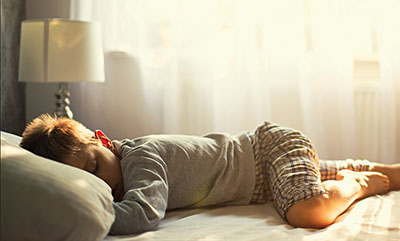New Directions on ADHD and Better Sleep
ADHD Weekly, February 16, 2023

You toss and turn, finally falling asleep around 3 AM. The alarm rings at 6 AM, leaving you bleary-eyed and unrested. Your whole day is plagued by higher levels of inattention and disorganization, and your temper becomes easily frayed. Many adults who have ADHD struggle to sleep, and researchers and professionals are rethinking what we know about ADHD and sleeping well.
ADHD and sleep difficulties
Sleep disorders, and difficulty sleeping, commonly co-occur with ADHD. Some health professionals speculate whether symptoms that seem to stem from ADHD may actually be a sleep disorder, or even that ADHD is a type of sleep disorder. ADHD is a brain-based condition with a strong genetic component, but the relationship between ADHD and sleep difficulties is important when evaluating for and treating ADHD.
The effect of sleep deprivation on both physical and mental health―whether one has ADHD or not―has long been recognized and studied. Sleep that is either too brief, interrupted, or disturbed has been associated with deficits in attention, learning and memory, and higher-order cognitive processes such as executive function and decision-making. Impaired sleep has also been shown to affect the expression and management of emotions, and to be associated with disorders such as major depression and PTSD. Poor sleep habits affect self-regulation and self-control, which are critically important functions impaired by ADHD symptoms.
Interest in the affects of sleep on ADHD
Investigations into sleep rhythms, sleep-onset insomnia (in which falling asleep is delayed by anywhere from one to four hours) and fluctuations in melatonin (a hormone important in the regulation of biorhythms and triggering sleep) are telling us more about the interactions of ADHD and sleep difficulties. Sandra Kooij, MD, PhD, presented at the 2017 European College of Neuropsychopharmacology Congress in Paris, kicking off a growing interest in the relationship between ADHD symptoms, sleep difficulties, and effective methods of helping people to get better sleep.
Dr. Kooij suggests the connection between ADHD and a person’s internal clock, or circadian rhythm, may be through the neurotransmitter dopamine, a brain chemical that seems to be at lower levels in most people who have ADHD. Stimulant medications help to increase the amount of dopamine, a “day hormone,” available in the brain. Melatonin helps to trigger the body toward sleep and increases starting in the early evening. The delay in melatonin release noted by ADHD researchers makes it hard for someone to fall asleep at the end of the day.
“So here we are getting closer to understanding how daytime dopamine, which is low in ADHD, and delayed melatonin function at night may be two sides of the same coin,” says Dr. Kooij.
Dr. Kooij found that adults with ADHD and sleep-onset insomnia often:
- had their onset of melatonin an average of one and half hours later than normal, which correlated with falling asleep much beyond their bedtime.
- had nighttime movement patterns and temperature fluctuations that occurred later than normal within twenty-four hours.
When it comes to sleep and children
Watching children struggle to go to sleep is a source of frustration for many parents, especially when they are aware that ADHD may be making a difficult situation worse. When, though, should parents become concerned?
“Studies have estimated that up to sixty percent of these children have significant sleep issues,” says Judith A. Owens, MD, MPH, a behavioral-developmental pediatrician. She directs the Pediatric Sleep Disorders Clinic and the Learning, Attention, and Behavior Clinic at Hasbro Children’s Hospital in Providence, Rhode Island.
“But what constitutes a ‘significant’ sleep problem often varies from one family to another, depending upon a parent’s expectations, the child’s temperament, and stress levels in the family,” she says. “In addition, sometimes parents are not even aware that their child may be having difficulty falling asleep or is waking up frequently during the night. If your child’s sleep issues seem to be negatively impacting his or her daytime functioning, if they are disruptive for the family, or are affecting your relationship with your child, these are all important reasons to seek help in dealing with them.”
Helping children to wind down from the day and supporting their inborn sleep rhythms are ways to encourage them to fall asleep. As starting points, Dr. Owens suggests a regular bedtime and wake-up time on weekdays and weekends; minimizing light exposure in the evening, especially from digital screens; and maximizing sunlight first thing in the morning.
She says that “the second category of good sleep habits involves those practices which help with ‘sleep conditioning.’” This is the association of sleep-promoting activities with bed and avoiding wake-promoting activities in bed, such as watching videos, texting, doing homework, and texting or talking on the phone. By keeping the bedroom, or at least the bed, reserved just for sleeping, the brain will associate it as a place of rest, rather than a place be alert. She adds that parents should avoid using a fluctuating bedtime as either a punishment or a reward for behavior.
“Parents should set a bedtime and wake-up time that ensures adequate opportunity for sleep,” she says, especially given the busy schedule many children and teens keep for sports, scouting, and part-time jobs. “Children’s sleep needs vary by age, so it’s important for parents to be aware of the amount of sleep their child is likely to need.”
Looking for a good night’s sleep? Get some tips:
- ADHD and Sleep Disorders
- Sleep and Children with ADHD: An Interview with Judith Owens, MD, MPH
- Your Lifestyle Will Determine Your Future
- ADHD Never Sleeps (But Children and Adults with ADHD Can)
- Optimizing Executive Functions Through Sleep
- How Can We Help Children with ADHD Get a Better Night’s Sleep?
- Prioritize Your Sleep for Good Health
Join the discussion: How do you settle down for restful sleep?
